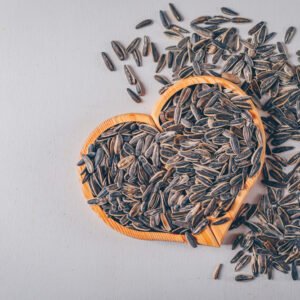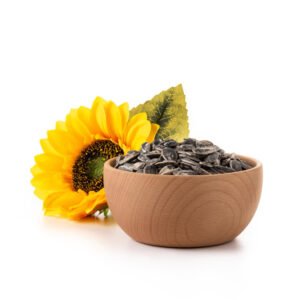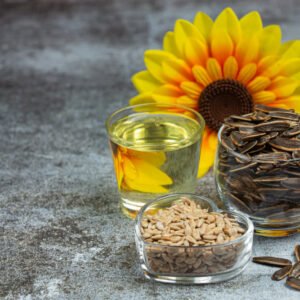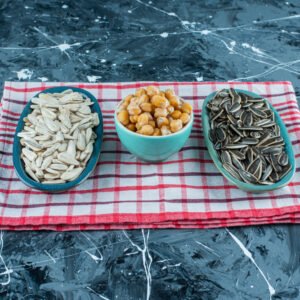Modern agricultural practices focus on maximizing crop yield to satisfy the increasing worldwide need for food. To increase productivity significantly farmers should implement crop protection products. These products enable farmers to fight against pests and diseases while controlling weeds that can cause substantial losses in both the quality and quantity of their harvests.
As an agricultural products manufacturer and supplier, CMS Industries stands at the forefront of delivering top-notch crop protection solutions. Their innovative products enable farmers to protect their crops while ensuring a sustainable increase in yields.
The extensive manual details how agricultural productivity increases through crop protection products and explains the various available types along with the benefits of selecting a reliable supplier such as CMS Industries.
What is Crop Protection?
The practice of crop protection involves multiple techniques and products that are used to protect crops from damaging pests, diseases, viruses, weeds, and insects. Plants face severe damage or destruction when exposed to these threats. The best approach is to adopt proactive strategies to reduce these risks instead of dealing with their consequences later. Through crop protection farmers can quickly adapt to climate change and identify harmful weeds, pests, or diseases in their earliest stages.
Read More: Use Spices and Herbs in Cooking
Why Crop Protection Is Important
The health and productivity of agricultural ecosystems depend heavily on effective crop protection measures. A range of organisms, including insects, weeds, fungi, and viruses, pose threats to plant growth across all farming environments. These damaging agents impede crop growth while simultaneously decreasing plant density and agricultural output. Unmanaged threats from organisms can destroy crops and harm both food production and farmers’ economic stability.
It is vital to implement preventive actions at appropriate times to minimize these risks. Timely interventions can reduce crop losses and sustain plant health during the entire growing season. Farmers who protect their crops from these threats can achieve better harvests and maintain steady production levels.
Crop protection plays an essential role in environmental preservation while increasing agricultural yields. Biodiversity conservation benefits from controlling invasive pests and diseases, which disrupt ecological balance. Through its protective measures, the soil maintains essential nutrients that contribute to long-term sustainable farming practices. This approach allows farmers to optimize their use of essential resources such as water, land and labor, which face growing scarcity issues.
Crop protection plays a critical role in ensuring food security while keeping food prices affordable. Optimized yields in healthy crops lead to reduced food production costs. As a result, consumers benefit from reduced prices and the food market achieves greater stability.
Understanding Crop Protection Products
Crop protection products are substances designed to protect plants from harmful organisms that can damage crops. They include:
- Pesticides (insecticides, herbicides, fungicides)
- Biological controls (natural predators, biopesticides)
- Plant growth regulators
- Soil treatments
These products help farmers maintain healthy crops, reduce losses, and improve overall yield.
How Crop Protection Products Boost Yield
1. Controlling Pests and Insects
Pests like aphids, locusts, and beetles can destroy entire fields if left unchecked. Insecticides target these pests, preventing them from feeding on crops and spreading diseases.
- Example: CMS Industries offers advanced insecticides that provide long-lasting protection without harming beneficial insects.
2. Preventing Crop Diseases
Fungal, bacterial, and viral infections can devastate crops. Fungicides and bactericides help prevent diseases like:
- Powdery mildew
- Blight
- Rust
By applying these products at the right time, farmers can ensure healthier plants and higher yields.
3. Eliminating Weeds
Weeds compete with crops for nutrients, water, and sunlight. Herbicides selectively target unwanted plants, allowing crops to thrive.
- Pre-emergent herbicides prevent weed growth.
- Post-emergent herbicides kill existing weeds.
4. Enhancing Plant Growth
Some crop protection products, like plant growth regulators, improve root development, flowering, and fruit setting. This leads to bigger, healthier harvests.
5. Improving Soil Health
Healthy soil is the foundation of high yields. Soil treatments and biofertilizers enhance nutrient availability, promoting stronger crop growth.
Benefits of Crop Protection
Crop protection products play a vital role in modern agriculture, ensuring higher yields, better food quality, and sustainable farming. Here are the key benefits of using these products:
1. Increased Crop Yield
Pests, diseases, and weeds can destroy up to 40% of global crops annually. Crop protection products minimize these losses, helping farmers achieve higher productivity per acre. This is crucial for feeding a growing population.
2. Improved Food Quality & Safety
Diseased or pest-infested crops often lead to poor-quality produce. Fungicides and insecticides prevent mold, rot, and contamination, ensuring healthier, market-ready food that meets safety standards.
3. Cost-Effective Farming
Preventing crop damage is cheaper than dealing with losses later. Farmers save money by reducing post-harvest waste and avoiding costly replanting.
4. Sustainable Agriculture
Modern crop protection products are designed to be eco-friendly, reducing soil degradation and water pollution. Biological pesticides and precision farming techniques further enhance sustainability.
5. Protection Against Climate Risks
Extreme weather and shifting pest patterns (due to climate change) make crops more vulnerable. Disease-resistant seed treatments and adaptive pesticides help farmers combat these challenges.
6. Supports Global Food Security
With the world population expected to reach 10 billion by 2050, efficient crop protection ensures stable food supply chains and reduces dependency on imports.
Read More: Benefits of Using Organic Fertilizers in Farming
How Do Farmers Protect Their Crops?
Farmers use a combination of methods to shield their crops from threats. Here’s how they do it:
1. Chemical Protection (Pesticides & Herbicides)
- Insecticides kill harmful bugs like locusts and aphids.
- Fungicides prevent mold, rust, and blight.
- Herbicides control weeds that steal nutrients.
2. Biological Pest Control
- Beneficial insects (like ladybugs) eat harmful pests.
- Microbial pesticides (e.g., Bacillus thuringiensis) target specific pests without harming crops.
3. Crop Rotation & Intercropping
- Rotating crops breaks pest life cycles.
- Planting complementary crops (like beans with corn) naturally repels pests.
4. Resistant Crop Varieties
- GM crops and hybrid seeds are bred to resist diseases and pests.
5. Precision Farming & Technology
- Drones and sensors detect early infestations.
- Smart spraying systems reduce chemical overuse.
6. Soil & Water Management
- Healthy soil = stronger plants. Biofertilizers and organic mulching improve resistance.
Farmers often combine these methods in Integrated Pest Management (IPM) for long-term, sustainable protection.
Chemical Crop Protection With Pesticides
Chemical pesticides remain a key tool for farmers worldwide. Here’s how they work and why they’re still essential:
Types of Chemical Pesticides
| Type | Target | Example Uses |
| Insecticides | Kills bugs | Aphids, beetles, caterpillars |
| Herbicides | Kills weeds | Prevents competition for nutrients |
| Fungicides | Stops fungi | Powdery mildew, rust |
| Nematicides | Kills nematodes | Soil-dwelling parasites |
Advantages of Chemical Pesticides
✔ Fast-Acting – Quickly eliminates threats before major damage.
✔ High Efficiency – One application can protect crops for weeks.
✔ Cost-Effective – Cheaper than organic alternatives for large farms.
✔ Scalable – Works for both small and industrial farms.
Challenges & Safe Usage
- Overuse can lead to pest resistance (requiring stronger doses).
- Environmental risks if misapplied (water pollution, harm to bees).
- Solution: Follow label instructions, use IPM strategies, and rotate chemicals.
Future of Chemical Pesticides
- Smarter formulations (target-specific, biodegradable).
- AI-driven precision spraying to reduce waste.
- Combining with biopesticides for safer farming.
Types of Crop Protection Products
| Type | Function | Examples |
| Insecticides | Kill harmful insects | CMS Industries’ pest control solutions |
| Herbicides | Eliminate weeds | Selective and non-selective herbicides |
| Fungicides | Prevent fungal infections | Copper-based fungicides |
| Biopesticides | Eco-friendly pest control | Neem oil, Bacillus thuringiensis |
| Plant Growth Regulators | Enhance crop development | Gibberellins, cytokinins |
Why Choose CMS Industries for Crop Protection?
As a trusted agricultural products manufacturer and supplier, CMS Industries provides:
✅ High-quality formulations for effective pest and disease control.
✅ Eco-friendly solutions that minimize environmental impact.
✅ Expert guidance on proper application techniques.
✅ Reliable supply chain ensuring timely delivery.
Farmers who partner with CMS Industries benefit from increased crop yields, reduced losses, and sustainable farming practices.
Best Practices for Using Crop Protection Products
To maximize effectiveness, farmers should follow these guidelines:
✔ Read Labels Carefully – Follow dosage and application instructions.
✔ Use Integrated Pest Management (IPM) – Combine chemical and biological controls.
✔ Rotate Products – Prevent pest resistance by alternating different formulations.
✔ Apply at the Right Time – Early intervention prevents severe infestations.
Conclusion
In today’s agriculture, crop protection products are vital for achieving healthy, high-yielding harvests. With increasing challenges such as pests, diseases, and unpredictable weather conditions, farmers rely on effective solutions to safeguard their crops and ensure consistent productivity. These products play a crucial role in reducing crop losses, maintaining plant health, and enhancing overall farm efficiency.
By investing in the right crop protection tools, farmers not only improve their yields but also support sustainable farming practices. Preventing the spread of harmful organisms early on helps minimize the need for excessive intervention later, reducing environmental impact and preserving soil health.
Choosing reliable, high-quality crop protection solutions is key to successful farming. CMS Industries offers a wide range of innovative and eco-friendly products designed to meet the evolving needs of modern agriculture. Their solutions help farmers manage threats proactively while promoting sustainability and long-term soil vitality.
With CMS Industries, farmers can be confident in the performance and safety of the products they use. These solutions support both productivity and environmental responsibility, making them a smart choice for today’s agriculture professionals.
Frequently Asked Questions (FAQs)
1. What Are Crop Protection Products, and Why Are They Important?
Crop protection products are chemical or biological agents used to safeguard crops from pests, diseases, and weeds. They are crucial because they prevent yield losses, improve food quality, and enhance farm profitability. Without them, farmers could lose up to 40% of their harvest to pests and diseases annually.
2. Are Crop Protection Products Safe for the Environment?
When used correctly, modern crop protection products are environmentally safe. Companies like CMS Industries develop eco-friendly formulations that minimize harm to beneficial insects and soil health. Following recommended application methods and dosage ensures sustainability while protecting crops effectively.
3. How Do I Choose the Right Crop Protection Product for My Farm?
Selecting the right product depends on factors like crop type, pest/disease pressure, and soil conditions. Consulting with experts from CMS Industries helps farmers choose tailored solutions for maximum effectiveness. Always check product labels and opt for tested, high-quality formulations.
4. Can Pests Develop Resistance to Crop Protection Products?
Yes, overusing the same product can lead to pest resistance. Farmers should rotate different active ingredients and adopt Integrated Pest Management (IPM) strategies to prevent resistance. CMS Industries provides diverse formulations to help farmers maintain long-term pest control efficiency.
5. How Do Biological Crop Protection Products Differ from Chemical Ones?
Biological products use natural organisms (like bacteria, fungi, or plant extracts) to control pests, whereas chemical products rely on synthetic compounds. Biological options are eco-friendly and sustainable, but may act more slowly. Combining both methods (IPM) ensures effective and balanced crop protection.





